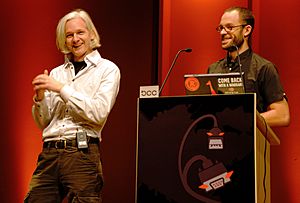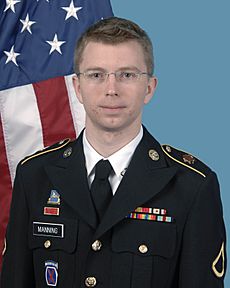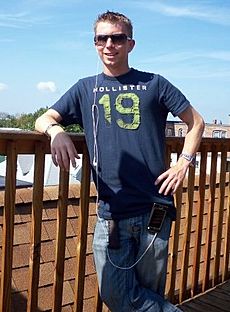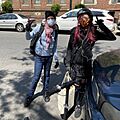Chelsea Manning facts for kids
Quick facts for kids
Chelsea Manning
|
|
|---|---|

Manning in 2022
|
|
| Born | December 17, 1987 Oklahoma City, U.S.
|
| Known for | Sharing secret government documents with WikiLeaks |
| Political party | Democratic |
| Criminal charge(s) | Accused of breaking the Espionage Act, taking government property, and disobeying orders |
| Criminal penalty | Sentenced to 35 years in a military prison (shortened to 7 years), lowered in rank to private, and given a dishonorable discharge |
| Military career | |
| Service/ |
United States Army |
| Years of service |
|
| Rank | Private |
| Unit | 2nd BCT, 10th Mountain Division (former) |
| Awards |
|
| Signature | |
Chelsea Elizabeth Manning (born Bradley Edward Manning, December 17, 1987) is an American activist and whistleblower. A whistleblower is someone who shares secret information that they believe shows wrongdoing. She is a former United States Army soldier. In 2013, she was found guilty of breaking the Espionage Act and other rules. This was after she gave nearly 750,000 secret military and government documents to the website WikiLeaks.
Manning was in prison from 2010 until 2017. Her sentence was shortened by President Barack Obama. In 2013, Manning shared that she is a trans woman and had felt like a girl since she was a child. She asked to be called Chelsea Manning.
In 2009, Manning worked as an intelligence analyst for the Army in Iraq. This job gave her access to secret government computer networks. In early 2010, she leaked the secret information to WikiLeaks. The information included videos of military actions, thousands of U.S. government messages, and Army reports about the wars in Iraq and Afghanistan.
Manning was found guilty of 17 charges. She was sentenced to 35 years in a military prison. In 2017, President Obama shortened her sentence to the seven years she had already spent in prison. Since her release, Manning has earned a living by giving speeches.
Contents
Early Life and Background
Childhood in Oklahoma
Chelsea Manning was born in 1987 in Oklahoma City, Oklahoma. Her mother, Susan Fox, was from Wales, and her father, Brian Manning, was an American. Brian served in the United States Navy as an intelligence analyst. Manning has an older sister. The family lived on a small piece of land near Crescent, Oklahoma, where they raised pigs and chickens.
Manning's father worked in information technology (IT) and had to travel often. Her mother was unable to drive, so the family was often isolated. Manning spent much of her time playing with Lego toys or on the computer.
As a child, Manning had strong opinions about religion and politics. For example, she would stay silent during the part of the Pledge of Allegiance that mentions God. Her father said she was very good at playing the saxophone, science, and computers. She even created a website when she was 10 years old.
Move to Wales

When Manning was a teenager, her parents divorced. In November 2001, when she was 14, Manning and her mother moved to Haverfordwest, Wales, to be near her mother's family. Manning attended the local secondary school, Tasker Milward. A friend from school described her as "very quirky, very opinionated, very political, very clever."
Manning was the only American at her school and was sometimes bullied by other students. They would make fun of her accent. Her aunt said that during a camping trip, the other students left her behind while she was sleeping.
Return to the United States
In 2005, at age 17, Manning returned to the U.S. to live with her father in Oklahoma City. She got a job as a software developer but was let go after a few months. Her boss said that sometimes Manning would "just lock up" and stare, making it hard to communicate.
After leaving her father's house, Manning lived with a friend in Tulsa and later moved to Chicago. When she ran out of money, her aunt in Potomac, Maryland, took her in. Manning spent 15 months with her aunt, which was one of the most stable times in her life. She took several jobs and studied history and English at a local college for a semester.
Military Service
Joining the Army
In 2007, Manning's father encouraged her to join the Army. She hoped to get a college education through the G.I. Bill and thought the masculine environment might help with her personal struggles. She began basic training at Fort Leonard Wood, Missouri, in October 2007.
Manning found basic training difficult. She was bullied by other soldiers. However, the decision to discharge her was canceled, and she started basic training again in January 2008. After graduating, she moved to Fort Huachuca, Arizona, to train as an intelligence analyst. She received a Top Secret security clearance, which gave her access to a large amount of secret information.
Deployment to Iraq
In August 2008, Manning was sent to Fort Drum in New York. She joined the 2nd Brigade Combat Team of the 10th Mountain Division. In October 2009, she was sent to a military base near Baghdad, Iraq. From her desk, she could access secret government computer networks.
Manning felt unhappy and alone in Iraq. She worked long night shifts, often 14 to 15 hours, in a small, crowded room. In December 2009, she became upset during a meeting and overturned a table. The next month, she began posting on Facebook that she felt hopeless.
Sharing Information with WikiLeaks
Manning said she first contacted WikiLeaks in January 2010. WikiLeaks is an organization that publishes secret information from anonymous sources. She had noticed the site in 2009 when it posted pager messages from the September 11 attacks.
In January 2010, Manning downloaded hundreds of thousands of documents about the wars in Iraq and Afghanistan. She saved the files on a CD-RW that she labeled "Lady Gaga" to avoid suspicion. She would pretend to listen to music while copying the files.
Manning decided to give the information to WikiLeaks. On February 3, she sent them the Iraq and Afghan War logs. A few weeks later, she sent them a video of a 2007 helicopter attack in Baghdad. Between March and April, she downloaded and sent about 250,000 U.S. government messages, known as diplomatic cables.
Manning told the court she developed a friendship with someone at WikiLeaks, believed to be Julian Assange. This friendship helped her feel less alone.
Email to Supervisor
On April 24, 2010, Manning sent an email to her supervisor with the subject line "My Problem." She wrote that she was struggling with her gender identity and attached a photo of herself dressed as a woman. She said she had felt this way for a long time and hoped the military would help, but it was not going away.
Her supervisor discussed the email with therapists but did not share it with his superiors. He was worried the photo would be passed around. A few weeks later, Manning had a fight with another soldier and was recommended for a discharge from the Army. Her security clearance, however, was not taken away.
Publication of Leaked Material

WikiLeaks was set up in 2006 for whistleblowers to submit secret information. Julian Assange, an Australian activist, was the site's leader. The U.S. government later tried to find out if Assange had encouraged Manning to leak the files.
On April 5, 2010, WikiLeaks released the Baghdad airstrike video, calling it "Collateral Murder." The video showed U.S. helicopters firing on a group of men, including two journalists from the news agency Reuters. The video was viewed by millions and made WikiLeaks famous.
On July 25, 2010, WikiLeaks and its media partners began publishing the Afghan War Logs. This was followed by the Iraq War Logs on October 22. These documents were secret military reports.
Starting in November 2010, WikiLeaks also began releasing the 251,287 U.S. diplomatic cables. These were messages written by American embassies around the world. The release of this information caused a worldwide stir.
Legal Case and Prison
Arrest and Charges
Manning was arrested on May 27, 2010, after an online acquaintance, Adrian Lamo, told the authorities about their chats. Manning had told Lamo that she had leaked the documents.
She was charged with 22 offenses, including breaking the Espionage Act. The most serious charge was "aiding the enemy," which could have led to a death sentence, but prosecutors did not seek it.
Detention and Trial
Manning was held at a military jail in Quantico, Virginia, from July 2010 to April 2011. She was kept in conditions that caused concern in the U.S. and around the world. She was held in a small cell by herself and had to follow strict rules. Juan E. Méndez, a United Nations Special Rapporteur, called her treatment "cruel, inhuman and degrading."
In April 2011, Manning was moved to a prison in Fort Leavenworth, Kansas, where conditions were better. Her trial began on June 3, 2013. She pleaded guilty to 10 of the charges, saying she leaked the information "to show the true cost of war."
On July 30, 2013, the judge, Colonel Denise Lind, found Manning guilty of 17 charges but not guilty of "aiding the enemy." On August 21, she was sentenced to 35 years in prison.
Sentence Commuted
In January 2017, President Barack Obama shortened Manning's sentence. He said her 35-year sentence was much longer than what other leakers had received. He changed her sentence to the nearly seven years she had already served.
Manning was released from prison on May 17, 2017. She thanked President Obama for giving her "another chance."
Gender Transition
The day after her sentencing in August 2013, Manning announced that she is a woman. In a statement, she said, "I am Chelsea Manning. I am a female." She asked to be called by her new name and to begin hormone therapy.
In April 2014, a court approved her legal name change to Chelsea Elizabeth Manning. While in prison, she sued the military to receive treatment for her gender identity. In February 2015, the Army approved her request for hormone therapy, a first for the U.S. military.
In September 2016, the Army also agreed to provide gender transition surgery. However, the surgery was not done before her release. After being released, Manning said she would get her own medical care. In October 2018, she announced on Twitter that she had undergone the surgery.
Life After Prison

After her release, Manning became a public speaker and activist. In September 2017, she was named a visiting fellow at Harvard University. However, the offer was taken back after some officials, including the head of the Central Intelligence Agency (CIA), criticized the decision.
In 2018, Manning ran for the U.S. Senate in Maryland as a Democrat. She challenged the current senator, Ben Cardin, in the primary election. She came in second, receiving about 6% of the vote.
From March 2019 to March 2020, Manning was jailed again. She refused to testify before a grand jury that was investigating WikiLeaks founder Julian Assange. She said she had already shared everything she knew during her trial in 2013. She was released when the grand jury's work was finished.
In October 2022, Manning published a book about her life called README.txt. It tells the story of her childhood, her time in the Army, and her experiences.
Images for kids
See also
 In Spanish: Chelsea Manning para niños
In Spanish: Chelsea Manning para niños
- Information security
- Information sensitivity
- List of people pardoned or granted clemency by the president of the United States
- Reception of WikiLeaks
 | Calvin Brent |
 | Walter T. Bailey |
 | Martha Cassell Thompson |
 | Alberta Jeannette Cassell |








